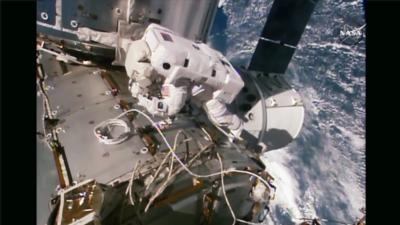Thu, Jun 27, 2024
The Old EVA Units Hold the Line 45 Years After They Were Designed - But Time's Running Out
Apparently the old NASA set the bar pretty high, now that rumors hint that RTX Collins Aerospace wants out of its contract to design them for the Artemis mission.

Reporters said that the RTX firm was in talks with NASA about dropping the contract, leaving NASA stuck with its now quite vintage Extravehicular Mobility Units spacesuits. That's bad news for the administration, since the 48-year-old equipment is a critical element in pulling off maintenance operations in orbit. The contract walkback comes at a bad time, too, with highly visible suit failures occupying the public eye. In recent weeks, NASA had to cancel a scheduled spacewalk twice, the first time citing discomfort issues, and the rescheduled walk canceled only a few minutes into its quarter-day runtime. The spacewalk ended just as quickly as it began when astronaut Tracy Dyson's suit sprung a leak, occluding the visor. That's not the first time, either. The space suits have been such a running issue that NASA's independent Aerospace Safety Advisory Panel has made it a tradition to call for their upgrade. But, development is evidently tougher than it was fifty years ago.

The contract saw $3.5 billion awarded to Collins and Axiom Space in 2022, intending to provide new space suits for extravehicular activity on the International Space Station and future lunar landings. Collings reportedly got almost $100 million of that chunk, specifically earmarked for ISS suit engineering. If they needed additional funding, they were to get extra portions from Axiom as work demanded. But one delay after another has put the contract on the backburner, leaving Collins wanting to "descope" its tasking of the Exploration Extravehicular Activity Services (xEVAS) contract. That will leave NASA in the lurch as it looks to assign Collins' work to someone else.

Axiom's efforts to make a more robust type of spacesuit fit for dusty lunar adventures may not be going so great either. Originally, the first flight-ready new xEMUs were to be ready by November 2024, but the usual delays through 2019 and beyond left the program all over the map. That's not all that surprising, since the suits were expected to be a part of a program to establish lunar landings by 2024. Across the board, things have gotten messy, as evidenced by a biting audit published in 2021. The Government Accountability Office dug deep into NASA's space suit approach, and criticized it for attempting to fund and procure two distinct, separate, and non-interchangeable space suit designs, noting that NASA had sunk more than a billion dollars into getting a next-gen suit for nothing but some non-functional window dressing. When all's said and done, today's program should have at least had two flight-ready suits, and an ISS demo suit.
More News
Ultrahigh Frequency (UHF) The frequency band between 300 and 3,000 MHz. The bank of radio frequencies used for military air/ground voice communications. In some instances this may >[...]
During The 7 Second Descent, There Was Another TAWS Alert At Which Time The Engine Remained At Full Power On October 24, 2025 at 2115 mountain daylight time, a Cirrus SR22T, N740TS>[...]
From 2009 (YouTube Edition): Educational Organization Aims to Inspire by Sharing Tuskegee Story Founding leader Don Hinz summarized the Red Tail Project’s mission in simple, >[...]
“This feels like an important step since space travel for people with disabilities is still in its very early days... I’m so thankful and hope it inspires a change in m>[...]
Also: New Katanas, Kern County FD Training, IndiGo’s Botched Roster, MGen. Leavitt Named ERAU Dean The Australian Transportation Safety Bureau (ATSB) has wrapped up its inves>[...]
 ANN's Daily Aero-Term (12.19.25): Ultrahigh Frequency (UHF)
ANN's Daily Aero-Term (12.19.25): Ultrahigh Frequency (UHF) NTSB Prelim: Cirrus Design Corp SR22T
NTSB Prelim: Cirrus Design Corp SR22T Classic Aero-TV: The Red Tail Project--Carrying the Torch of the Tuskegee Airmen
Classic Aero-TV: The Red Tail Project--Carrying the Torch of the Tuskegee Airmen Aero-News: Quote of the Day (12.19.25)
Aero-News: Quote of the Day (12.19.25) Airborne 12.17.25: Skydiver Hooks Tail, Cooper Rotax Mount, NTSB v NDAA
Airborne 12.17.25: Skydiver Hooks Tail, Cooper Rotax Mount, NTSB v NDAA





